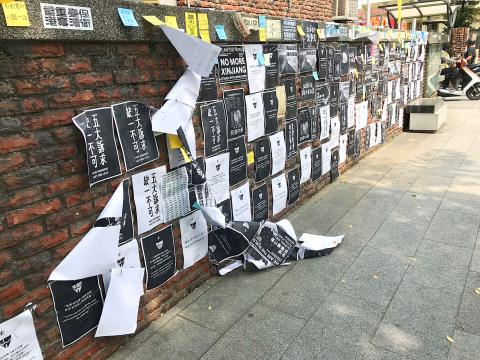The slew of incidents involving Chinese students vandalizing pro-Hong Kong democracy “Lennon walls” on campuses in Taiwan and threatening Hong Kong students are a manifestations of a collective anxiety, National Tsing Hua University professor Cheng Chih-peng (鄭志鵬) said yesterday.
Since Taiwan allowed Chinese students to study in Taiwan in 2011, they have never made such an aggressive political statement, not even during the Sunflower movement and Hong Kong’s “Umbrella movement,” Cheng said.
He cited three possible causes of anxiety among Chinese students in Taiwan.

Photo: Liu Wan-chun, Taipei Times
First, Chinese President Xi Jinping (習近平) has been pushing the so-called “Chinese dream” since his rise to power, elevating Chinese ethnocentrism, he said.
With China’s rapidly growing economic power, ethnocentrism has prompted Chinese to seek recognition from the international community, he said.
However, some Chinese students studying abroad feel anxious, because many countries are not so friendly toward China, he said, adding that incidents of Chinese students seeking to impose their views on others have not only occurred in Taiwan, but also in Western countries.
Second, the anti-extradition bill movement in Hong Kong has showen many Taiwanese that Beijing reneged on the promise that it would maintain a “one country, two systems” policy there, which has increased Taiwanese’s distrust of the Chinese government, making unification with Taiwan even more unlikely, he said.
Third, Taiwanese students have become increasingly aware of the “Chinese factor” and more vigilant of China’s tactics to influence Taiwanese society, which is a source of contention between Taiwanese and Chinese students, especially during discussions of public affairs, Cheng said.
Regarding speculation that alleged vandalism of Lennon walls by Chinese students had been orchestrated, Cheng said that people should not view Chinese students as a group that cannot be reasoned with, but should try to understand what has made them anxious.
Cheng said he could not approve of the Ministry of Education leaving incidents of vandalism in the hands of universities.
The ministry should set a standard for dealing with such incidents to prevent inadequate policies being set by institutions, he said.
Cheng said he could not agree with Immigration Agency Director-General Chiu Feng-kuang’s (邱豐光) statement that if Chinese sabotage Lennon walls, they could be barred from re-entering the nation.
It is generally accepted that students should be given a second chance if they have made a mistake at university, so the authorities should not have a “double standard” on this matter, he said.
Puma Shen (沈伯洋), an associate professor in National Taipei University’s Graduate School of Criminology, said that similar incidents have occurred in other countries, so Taiwan needs to introduce a model to handle conflicts on campus to better manage risks.
The authorities should provide counseling to Chinese studying in the nation and help them form an understanding of the predominant public opinion to help them interact with classmates, Shen said.
Students from both sides should keep in mind that the point is to exchange ideas, which should be based on democratic values, he said.
If Taiwan cannot abide by democratic institutions, it would defeat the purpose of allowing in Chinese exchange students, he said.
Academic exchanges are a way for Taiwanese to win the approval of young Chinese, so the vandalism of the Lennon walls should not be treated in a manner that would only escalate hostility, he said.

Taiwan is stepping up plans to create self-sufficient supply chains for combat drones and increase foreign orders from the US to counter China’s numerical superiority, a defense official said on Saturday. Commenting on condition of anonymity, the official said the nation’s armed forces are in agreement with US Admiral Samuel Paparo’s assessment that Taiwan’s military must be prepared to turn the nation’s waters into a “hellscape” for the Chinese People’s Liberation Army (PLA). Paparo, the commander of the US Indo-Pacific Command, reiterated the concept during a Congressional hearing in Washington on Wednesday. He first coined the term in a security conference last

DEFENSE: The National Security Bureau promised to expand communication and intelligence cooperation with global partners and enhance its strategic analytical skills China has not only increased military exercises and “gray zone” tactics against Taiwan this year, but also continues to recruit military personnel for espionage, the National Security Bureau (NSB) said yesterday in a report to the Legislative Yuan. The bureau submitted the report ahead of NSB Director-General Tsai Ming-yen’s (蔡明彥) appearance before the Foreign and National Defense Committee today. Last year, the Chinese People’s Liberation Army (PLA) conducted “Joint Sword-2024A and B” military exercises targeting Taiwan and carried out 40 combat readiness patrols, the bureau said. In addition, Chinese military aircraft entered Taiwan’s airspace 3,070 times last year, up about

A magnitude 4.3 earthquake struck eastern Taiwan's Hualien County at 8:31am today, according to the Central Weather Administration (CWA). The epicenter of the temblor was located in Hualien County, about 70.3 kilometers south southwest of Hualien County Hall, at a depth of 23.2km, according to the administration. There were no immediate reports of damage resulting from the quake. The earthquake's intensity, which gauges the actual effect of a temblor, was highest in Taitung County, where it measured 3 on Taiwan's 7-tier intensity scale. The quake also measured an intensity of 2 in Hualien and Nantou counties, the CWA said.

The Overseas Community Affairs Council (OCAC) yesterday announced a fundraising campaign to support survivors of the magnitude 7.7 earthquake that struck Myanmar on March 28, with two prayer events scheduled in Taipei and Taichung later this week. “While initial rescue operations have concluded [in Myanmar], many survivors are now facing increasingly difficult living conditions,” OCAC Minister Hsu Chia-ching (徐佳青) told a news conference in Taipei. The fundraising campaign, which runs through May 31, is focused on supporting the reconstruction of damaged overseas compatriot schools, assisting students from Myanmar in Taiwan, and providing essential items, such as drinking water, food and medical supplies,